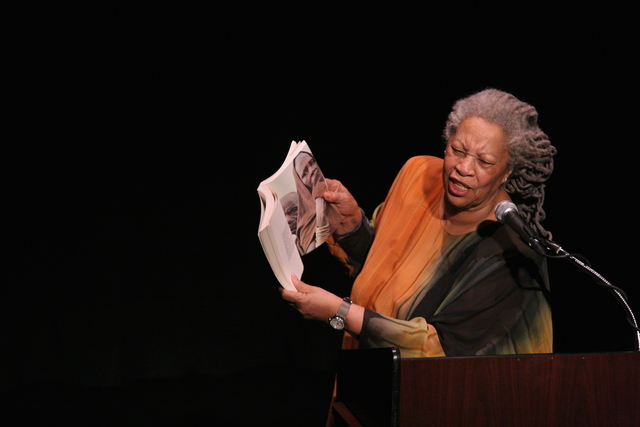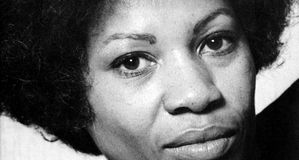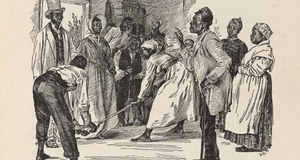Naming and Identity in Toni Morrison's Beloved and Song of Solomon
By
2014, Vol. 6 No. 06 | pg. 1/3 | »
KEYWORDS:
As an African American author, Toni Morrison is acutely aware of the pain that is intertwined with the history of her history. She articulates the debilitating physical and psychological strain that slavery, prejudices, and discrimination placed upon countless African Americans with incredible detail. One of her most powerful statements, however, comes in just one sentence near the end of Beloved. It is a truth that all African Americans know, one that was born out of slavery, one that still burns people today: the truth that “anybody white could take your whole self for anything that came to mind” (Morrison, 1987, p. 295). This statement explains why Morrison names her characters so carefully, as does this quote from The Toni Morrison Encyclopedia: “Morrison focuses upon how Africans lost their names through the institution of slavery, which in turn created a loss of connection with their ancestry” (Beaulieu, 2003, p. 171). Her characters, especially those in Beloved and Song of Solomon, need to know their true names and past to reclaim, and in some cases recreate, their own identities. As Morrison herself says in an interview, “Although history should not become a straitjacket, which overwhelms and binds, neither should it be forgotten. One must critique it, test it, confront it, and understand it to achieve true, adult agency” (Schappell, 1993, p. 20). "Although history should not become a straitjacket, which overwhelms and binds, neither should it be forgotten. One must critique it, test it, confront it, and understand it to achieve true, adult agency." Photo: Flickr/Angela Radulescu NCSA-2 Neal also commented, “What happened to Black identity under the American impact were twin processes: its dis-Africanization, on one side, and its racialization on the other” (pp. 52-53). Hence, African Americans are a minority within minorities. The memory of dislocation is augmented when one compares African Americans to, say, Irish Americans, German Americans, or Italian Americans. The African American realizes, again, that he alone cannot identify with a true homeland. This inability to identify a true home comes with negative consequences. Nancy Jesser (1999) stated, “Because slavery, colonization, and racism penetrated every moment in U.S. history, there is a sense in which all homes are…to paraphrase Baby Suggs, haunted by a ‘Negro’s grief’” (p. 326). This is true of 124, which is haunted by Beloved’s ghost. She cracks mirrors, puts her hand prints in cakes, and hurls furniture around the house in a wild rage. Additionally, the name (if one can call it that) of the house signifies grief because, for much of the book, there are four people around the house: Sethe, Denver, Paul D. and Beloved (in both her ghost form and her physical form). However, there are times when one of these four is physically or mentally absent or distant from the others. Obviously, Beloved’s ghost is present early in the novel because her body no longer exists. Denver escapes to the emerald room in the woods behind 124 and turns it into a sanctuary that is “closed off from the hurt of the hurt world” (Morrison, 1987, p. 35). Paul D. departs after Stamp Paid informs him that Sethe committed infanticide. Sethe herself is weakened by the parasitic Beloved. She becomes “limp and starving but locked in a love that wore everybody out” and is unable “to care what the next day might bring” (Morrison, 1987, p. 286). Sweet Home is also infected with African American grief. At first glance, the name seems painfully ironic. It appeared to be a sweet home for slaves when the Garners owned it. When Sethe thinks of Sweet Home, she recalls how “it rolled itself out before her in shameless beauty. It never looked as terrible as it was and made her wonder if hell was a pretty place too” (Morrison, 1987, p. 7). Later on, when the Bodwins are setting Baby Suggs up in her new house, Mr. Garner asks her about her experience to show off to the siblings. She recounts how she never went hungry, never went cold, was not beaten, and was granted her freedom (Morrison, 1987, p. 172). Additionally, slaves were “allowed, encouraged to correct Garner, even defy him. To invent ways of doing things; to see what was needed and attack it without permission” (Morrison, 1987, p. 147). The Garners’ method of running Sweet Home stands in stark contrast to Schoolteacher’s harsh rule. Specifically, he does not share Mr. Garner’s idea that slaves should express or even have opinions. For instance, after Schoolteacher restricts the slaves’ diets, he learns that Sixo stole and ate a pig. Sixo argued that his action should be commended. He went out of his way to improve himself, the Schoolteacher’s property. As a result, he will be able to work harder and longer. Schoolteacher admits that Sixo’s logic is sound, but whips him anyway to prove that the power to name things lies with the definers, not those who are being defined. This anecdote highlights the drastic change that has befallen Sweet Home and echoes the idea that naming is a powerful tool. Upon a more painstaking examination of Sweet Home, we find that the name is actually doubly ironic. Jesser’s article shows that the place is not a true home for the slaves even when Mr. Garner is the master because it does not value their humanity. It values only their labor. As soon as they step off the property, the slaves are “trespassers among the human race” (Morrison, 1987, p. 148). Also, when Mr. Garner decrees that he must accompany slaves who leave the property, he does so not because of possible legal troubles, but because of the danger of letting slaves who are called “men” on the loose. This emphasizes the fact that Garner is only raising his slaves like men because it benefits Sweet Home. The slaves’ manhood is nothing more than a creation of the slave owner. It does not give them any benefits outside of Sweet Home. In addition, when slaves do leave Sweet Home, Mr. Garner’s physical presence reminds them of their submissive status. He may be kinder and more humane than Schoolteacher, but he is still their owner. The name of the Dead home in Song of Solomon is also ironic. If one was to look up their address in a telephone book, it would say they lived on Mains Street. The African American community does not call it that. They renamed it Doctor Street to honor Dr. Foster, or, to be more specific, to pay “their respect to whatever it was that made him be a doctor in the first place, when the odds were that he’d be a yardman all of his life” (Morrison, 1977, p. 329). After he passes, they begin calling it Not Doctor Street. These names show the importance of heritage to the black community. They are proud of Dr. Foster despite the fact that he was a haughty man. The name also distinguishes the blacks from the whites, who only refer to the street by its proper name. Macon Dead makes sure he separates himself from the community entirely. He is neither black nor white. Unlike other drivers, he “hailed no one and no one hailed him. There was never a sudden braking…to shout or laugh with a friend” (Morrison, 1977, p. 32). Macon’s name, too, sets him apart from the community. While other blacks discover solidarity through their names, Macon’s name is only useful in describing himself and his car, because “other than the bright and roving eyes of Magdalene called Lena and First Corinthians, the Packard had no real lived life at all. So they called it Macon Dead’s hearse” (Morrison, 1977, p. 33). One of the most important questions that Neal (1999) raises in his article is, “Does the name determine the status or reality of a thing?” Or “does the reality of a thing determine the name, definition, conceptualization, and interpretation?” (p. 52). In other words, does it matter that African Americans were named by white people? Does a name have the power to create an identity? Based on some of the scenes in Beloved, Morrison believes it does. For instance, when Sethe was taking some bean soup to Mrs. Garner, she overheard Schoolteacher instructing a nephew to correctly place her animal and human characteristics side by side. We see how this lesson affected Sethe later when she tells Paul D. how she committed infanticide. Paul D. says her actions were wrong.Continued on Next Page » Suggested Reading from Inquiries Journal
Inquiries Journal provides undergraduate and graduate students around the world a platform for the wide dissemination of academic work over a range of core disciplines. Representing the work of students from hundreds of institutions around the globe, Inquiries Journal's large database of academic articles is completely free. Learn more | Blog | Submit Latest in Literature |

















